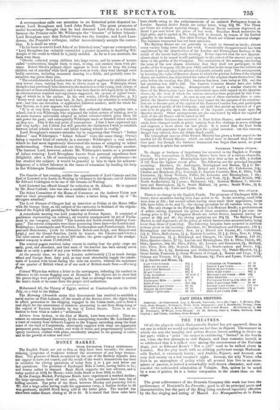The Gazette of last evening notifies the appointment of Lord
Camoys and the Earl of Listowel to be Lords-in-Waiting in Ordinary to the Queen; and of Admiral Sir Edward Codrington to be one of the Grooms-in-Waiting.
Lord Listowel has offered himself for reelection at St. Alban's. He is opposed by Mr. Bond Cabbell; who was also a candidate in 1841.
The Select Committee of the House of Commons on the Andover Union now condact their proceedings with closed doors; a notice being stuck up of "No strerngers admitted."
'The Lcrd Provost of Glasgow had an interview on Friday at the Home Office with Sir George Grey, on the subject of the extension to Scotland of the stipula- tions of the English bill providing for baths and washhouses.
A remarkable meeting was held yesterday at Euston Square. It consisted of gentlemen representing six railways, all recently amalgamated by act of Parlia- ment in one company, entitled "The London and North-western Railway Com- pany." The several companies were those possessing these lines—the London-and Birmingham, Leamington-and-Warwick, Northampton-and-Peterborough, Liver- pool-and-Manchester, (with its tributaries Bolton-and-Leigh, and Kenyon-and Leigh,) and the Grand-Junction, (with its branch, the Chester-and-Crewe.) The total extent of railway is about 330 miles; the gross capital of the amalga- mated company is about 17,000,000L!
The country parrs received today concur in stating that the grain crops are early, good, and abundant, and that more of the harvest has been already saved than at so early a pelted of any year within recollection.
At the present time, we have in London unfortunately (1) as much foreign wheat and foreign flour, duty paid, as may most abundantly supply the inhabi- tants of London with bread during the next six months, without the assistance of one quarter of British wheat or of one sack of British-made flour.—Morning Post.
Colonel Whyte has written a letter to the newspapers, defending his conduct in reference to the recent flogging case at Hounslow. His objects are to show that the proceedings were perfectly regular, and that no attempt was made to conceal the man's death or its cause from the proper civil authorities.


























 Previous page
Previous page